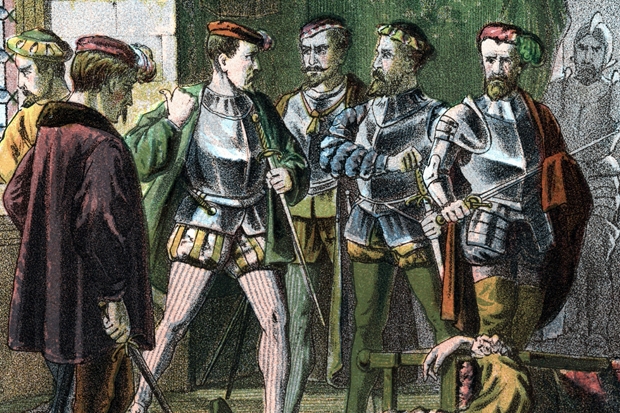The Brethren, by Robert Merle, who died at the age of 95 ten years ago, was originally published in 1977, the first in a sequence of historical novels that sold millions in their native France but have gone untranslated until now. Set in a plague-ridden, conflict-ravaged 16th century, rife with beheadings, hangings, abductions and rape, it’s a visceral yet strangely jaunty chronicle of provincial life after the Reformation.
The title refers to a partnership between war veterans Jean de Siorac and Jean de Sauveterre. One is a libidinous medical graduate, the other a more dour Protestant with a dim view of his pal’s bastard-fathering ways. Together they hang up their swords and use their accumulated plunder to hoover up land in southwest France and build a dynasty. Narrating their efforts is young Pierre de Siorac, whom we follow from the ages of about six to 12, or, in this world, adulthood.
One chapter ends, ‘The gypsies are attacking!’ The mainstay of the novel is swashbuckling action, as the two Jeans are forced to defend their gains and swell their coffers by returning to the battlefield to join in various foreign wars. What stands out is Merle’s eye for detail. Even when it’s boring — pages and pages on castle architecture — there’s a dividend: Pierre notes that while the openings in fort walls are great for pouring hot pitch on invaders, they do make the humidity of a moat a pain if you’re trying to sleep.
Merle uses the first-person narration to elicit sympathy for the protagonist while revealing his blind spots. Much of it seems meant to be read against the grain. ‘Not a summer passes without finding some poor beggar in our orchards,’ says Pierre. ‘My mother finally got [my father] to agree to knock these poor devils senseless before hanging them and not to leave their bodies to rot on the gallows as was the custom.’
In this way we get a panoramic survey of contemporary society, even as Merle focuses the novel’s perspective on new money. One terrific scene shows how the Jeans exploit the Reformation to cut costs. When they request that their labourers swear off Catholicism, they’re asked if they’ll still celebrate saints’ days. No need, comes the reply. ‘Thought as much,’ mutters the questioner, the workers realising they’ve just lost 50 holidays a year.
Merle balances Pierre’s boyhood memories with his reflections as an adult; the narrator comments on his childhood innocence but doesn’t perform it, which makes sense when so many passages drool over his busty wet nurse and her ten-year-old daughter, with whom Pierre cavorts while the grown-ups are abed. Sectarian strife in the nation has a domestic parallel as his mother refuses to renounce the Virgin Mary, which Pierre himself finds hard. ‘There seemed to be only men to love in this new religion,’ he thinks; a wry remark in a novel in which the women die in order to give the male characters depth.
Twelve further instalments await, with part two, City of Wisdom and Blood, due next year.
Available from the Spectator Bookshop, £11.69 Tel: 08430 600033






Comments